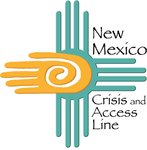Wind: 10.4 mph, S
Welcome to our new web site!
To give our readers a chance to experience all that our new website has to offer, we have made all content freely avaiable, through October 1, 2018.
During this time, print and digital subscribers will not need to log in to view our stories or e-editions.






“We’re here to meet the needs of the community,” Doña Ana County Crisis Triage Center (CTC) Clinical Director Jess Spohn said as the center nears its first anniversary.
“Don’t be scared to ask for help,” CTC Program Director Karina Diaz said. “You’re not alone.”
Since opening June 21, 2021, CTC has served about 600 clients and is continuing to connect with law enforcement agencies, healthcare providers and the community to make its services known and to reduce the stigma and misinformation that surround mental and behavioral health, Diaz said.
CTC, 1850B Copper Loop in Las Cruces, provides free services to anyone over age 18 experiencing a mental health crisis.
“We say ‘yes’ to anyone coming into our center,” Diaz said.
Diaz said CTC is open 24 hours a day, seven days a week, 365 days a year, with licensed staff working in four shifts.
“’It’s a safe place for me,’” is the clear message a visitor receives from the moment he or she enters CTC, Diaz said.
Each client (CTC staff call them “guests”) receives a psychiatric evaluation and medical check during his or her visit. Staff can help those with substance-abuse issues begin or continue detox, and the center’s “recovery culture” might include participation in a virtual Alcoholics Anonymous meeting or similar program. Treatment is often guided by peer support specialists who have dealt with their own mental and behavioral health issues.
The center also provides meals, showers and a laundry.
As part of the treatment plan CTC staff help them create, clients receive referrals “to the next level of care,” Diaz said. CTC staff make contact with clients within 72 hours of a center visit to ensure they are “receiving the services they need,” Spohn said.
Spohn and Diaz said CTC’s community outreach includes connecting with all the agencies, programs and support groups that might provide additional services to a client.
Although a client’s visit to CTC cannot exceed 24 hours, repeat visitors are welcome “no matter how many times you’ve been there,” Spohn said.
The center is seeing an average of four guests per day and has had a steady increase in visitors: two in June and 11 in July 2021; 93 in March and 102 in April 2022.
The center needs to reach an average of about six guests per day to break even, county Health and Human Services Department Director Jamie Michael said at the Las Cruces City Council’s May 23 work session.
All CTC clients are voluntarily at the center, either coming on their own or being brought by someone else, Diaz said. Referrals come from a variety of local providers, law enforcement agencies and hospitals, and, most frequently, from friends or loved ones, Diaz said.
Diaz said CTC is working to “increase diversion from emergency rooms” to the triage center, which she said is “a more appropriate resource.”
“We want to be able to meet the needs of people who need this care,” Michael said.
CTC has a mobile response unit that can travel anywhere in the county to bring people to the center, Diaz said. Staff also respond to phone inquiries and to visitors who only want to learn more about what CTC offers.
Diaz said CTC is expecting an increase in calls, referrals and visits after July 16. That’s the start date for the new national 988 three-digit dialing code that will route callers to the National Suicide Prevention Lifeline.
CTC is operated by Recovery Innovations International (RI), based in Arizona, under a contract with the county. RI is a national leader in crisis care, Michael said. Seven members of the RI team were among about a dozen contributors to the national guidelines for behavioral health crisis care that CTC and other programs like it follow.
Call CTC at 575-449-8159.
Visit https://riinternational.com/listing/dona-ana-crisis-triage-center/.
From the New Mexico Crisis and Access Line
Warning signs and symptoms of crisis that are clear indications that you or a loved one need to talk to a mental health professional include talking about feeling helpless, hopeless or worthless; thinking of hurting or killing yourself or someone else; concerns about alcohol, drug use or other addictions; feeling sad, anxious, trapped or in unbearable pain; showing rage or talking about seeking revenge; experiencing extreme mood swings; sleeping too much or too little; talking about being a burden to others; withdrawing or becoming isolated; just needing to talk to a mental health professional.
Call New Mexico Crisis and Access Line (NMCAL): 1-855-662-7474 (24/7/365); New Mexico Peer-to-Peer Warmline: 1-855-466-7100 (daily, 7 a.m.-11:30 p.m., text 6- 11 p.m.).
NMCAL services are free and confidential. It is funded by the New Mexico departments of Health; Children, Youth and Families; and Human Services.
Visit www.nmcrisisline.com.
Other items that may interest you
